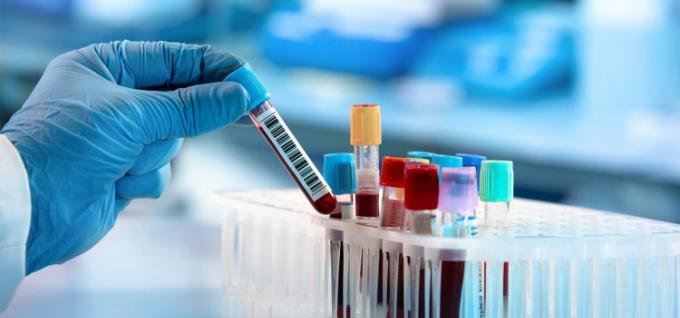After the baby is born, the mother's body can still encounter dangerous problems, such as postpartum pre-eclampsia. Women with pre-eclampsia are 3.7 times more likely to develop high blood pressure in the future, 2.2 times more likely to develop anemia, and 1.8 times more likely to stroke than women without. preeclampsia.
Pregnancy is a woman's favor, but besides that, some health complications will always accompany pregnant mothers. Postpartum pre-eclampsia is a pretty serious condition that hasn't received much attention. Let aFamilyToday Health learn about this disease through the article below.
What is postpartum preeclampsia?
Postpartum pre-eclampsia is like preeclampsia that happens in pregnancy. The main symptom of this complication is high blood pressure and a lot of protein in the urine (over 300 mg).
This usually occurs 48 hours after the baby is born or 6 weeks after. If eclampsia occurs after 6 weeks, it is called late eclampsia.
If you have pre-eclampsia after giving birth, you'll need to stay in the hospital longer until your blood pressure is under control. In the event that high blood pressure persists, you will need to take medication to control your cardiovascular risk.
Symptoms of postpartum pre-eclampsia
It is difficult to detect pre-eclampsia after birth. Usually, mothers do not experience any symptoms during pregnancy. After the baby is born, caring for your baby will also make you ignore the symptoms of pre-eclampsia. Here are the common symptoms:
High blood pressure (140/90 or higher);
More than 300mg of protein in urine;
Temporary loss of vision or blurred vision. Eyes become sensitive to light;
Feeling of nausea, severe headache, or abdominal pain (under the right rib);
The amount of urine decreased;
Sudden weight gain (about 1kg / week);
Swollen feet and face.
The cause of pre-eclampsia after birth

The exact cause of pre-eclampsia postpartum is unknown. This disease may begin to develop in a mother's body before birth, but only manifest after the baby is born.
If a family member has a history of pre-eclampsia, you are also at risk. In addition, a number of other factors also make you more susceptible to this disease.
Factors associated with postpartum pre-eclampsia
You are at risk for postpartum pre-eclampsia if:
High blood pressure after 20 weeks of pregnancy;
Pregnant before the age of 20 or after 40;
There is a loved one with pre-eclampsia;
Being overweight and weight gain during pregnancy ;
Carrying twins or multiple births.
Diagnosis of postpartum pre-eclampsia

1. Blood test
Blood tests help check the function of the liver and kidneys, and help the doctor know if the platelet count is decreasing. Determining the platelet count is essential, as these cells help prevent blood clotting and excessive bleeding.
2. Urine test
The purpose of a urine test is to check the amount of protein in it. If your protein levels are high then you're more likely to have pre-eclampsia postpartum. Even after you are discharged from the hospital, you must have regular check-ups and blood pressure checks.
Go to the doctor
Do not worry or stress too much because the purpose of this is just to understand your own health situation only. Go with your husband or someone you feel close to. If you are too anxious and frightened, you will not be able to focus on what the doctor says. The person next to you will help you remember the doctor's advice.
To save time, you should make an appointment and make a list of questions you want to ask, such as:
If there are no blood pressure problems during pregnancy can I have pre-eclampsia after giving birth?
What foods SHOULD and SHOULD eat?
Can the symptoms of pre-eclampsia be identified immediately after birth?
During your visit, your doctor will explain the course of pre-eclampsia treatment after your baby is born.
Treatment of pre-eclampsia after giving birth
If you have pre-eclampsia after giving birth, your doctor will prescribe medication to treat high blood pressure. In mild cases, you may be prescribed magnesium sulfate within 24 hours. Your doctor will check for postpartum pre-eclampsia symptoms, including a blood pressure test and a urine test.
If your blood pressure is above 150/100, you will be given blood pressure medication. Note that all medications to treat high or low blood pressure cause headaches, flushing, nausea, and a rapid heartbeat.
Your blood pressure will be closely monitored and the amount of medicine will decrease gradually until your blood pressure returns to normal.
Is pre-eclampsia dangerous after giving birth?
Your blood pressure should return to normal within a few days of giving birth. However, in some cases it can take 6 weeks or more, and if you have this condition, you are at risk for many other complications:
Late eclampsia has symptoms similar to pre-eclampsia, and both lead to epilepsy. They can permanently damage vital organs such as the brain, kidneys, and liver. If not treated in time, it can lead to coma and even death;
Venous thromboembolism is a combination of 2 symptoms of deep vein thrombosis and pulmonary embolism. The condition often makes it difficult for mothers to breathe, have chest pain, cough, anxiety and fever. Severe cases can lead to death;
A stroke occurs when the brain stops blood supply resulting in dysfunction of other organs;
Pulmonary edema is a very serious respiratory system condition. The cause of this problem is fluid accumulating in the lungs. Symptoms of this complication include difficulty breathing, coughing up blood, anxiety and heavy sweating;
HELLP (anemia, elevated liver enzymes and thrombocytopenia) syndrome is a variant of pre-eclampsia. It causes hepatitis and hemorrhage.
Frequently asked questions about postpartum pre-eclampsia
Can postpartum pre-eclampsia affect my baby?

Pregnant mothers with pre-eclampsia can lead to premature birth. Babies born before 37 weeks are called premature and if they are born before 32 weeks there is a risk of many diseases. In such cases, the darling needs to be cared for in the incubator.
Can pre-eclampsia appear again?
If you have had pre-eclampsia in the previous pregnancy, the risk of pregnant women having this disease again in the next birth is very high. You are also at risk if you have high blood pressure, are obese or have a loved one with it.
Is it possible to breastfeed if I have pre-eclampsia postpartum?
Even if you have postpartum pre-eclampsia, it is possible to breastfeed your baby . However, this health condition can lead to a lack of milk.
What is the difference between pre-eclampsia and eclampsia?
Pre-eclampsia is a disorder that occurs in women who are 20 weeks pregnant. With this condition, the patient usually has high blood pressure and high protein in the urine.
Eclampsia is a pre-eclampsia condition, which can be dangerous for both mother and baby. This disorder can lead to coma, brain damage, and seizures.
Is it possible to get pre-eclampsia without protein in the urine?
Recent studies show that preeclampsia can occur even in the absence of protein in the urine ( proteinuria ).
Is there a way to prevent this?
In fact, despite the development of medicine, there is currently no way we can prevent postpartum pre-natal. However, taking care of your health during pregnancy carefully will help you reduce your risk of developing this disease. Here are some suggestions that vote can apply:
Maintain body weight
Pay attention to your pre-pregnancy weight. After that, you should keep your weight within the recommended range by eating properly and exercising. Being overweight or being overweight during pregnancy can cause many health problems , including pre-eclampsia. Check your weight regularly and if you notice unusual weight gain, see your doctor right away.
To ensure that your weight is always within the acceptable range, you should consult your doctor or dietitian about your diet. In addition, if you are overweight or obese during pregnancy, pregnant mothers should apply reasonable measures to lose weight during pregnancy .
Healthy eating
Include vitamins , minerals and antioxidant-rich foods in your daily diet. This will help you maintain a steady blood pressure throughout your pregnancy. Note that pregnant mothers should stay away from processed snacks.
To satisfy your hunger, you can nibble on walnuts, sunflower seeds, lotus seeds , and cashews. .. in general are nuts for pregnant women to keep mothers healthy and healthy.
Full water replenishment

Pregnant mothers should drink plenty of fluids, especially water and milk. However, you should avoid fruit juices that contain sugar and limit alcohol and caffeine .
Periodic pregnancy check-up
During your pregnancy, have regular prenatal check- ups and regular blood pressure checks. This routine pregnancy check-up can help doctors detect the warning signs of pre-eclampsia in time.
Postpartum is a period of extreme stress and fatigue, especially when you have pre-eclampsia. Be strong in seeking help. Have family members stay by to take care of your home while you focus on breastfeeding and taking care of yourself . Whenever something is out of the ordinary, go see your doctor and ask about your concerns.
Through the above sharing, hopefully pregnant mothers have got the necessary information about pre-eclampsia. Take good care of yourself to avoid getting this disease.















